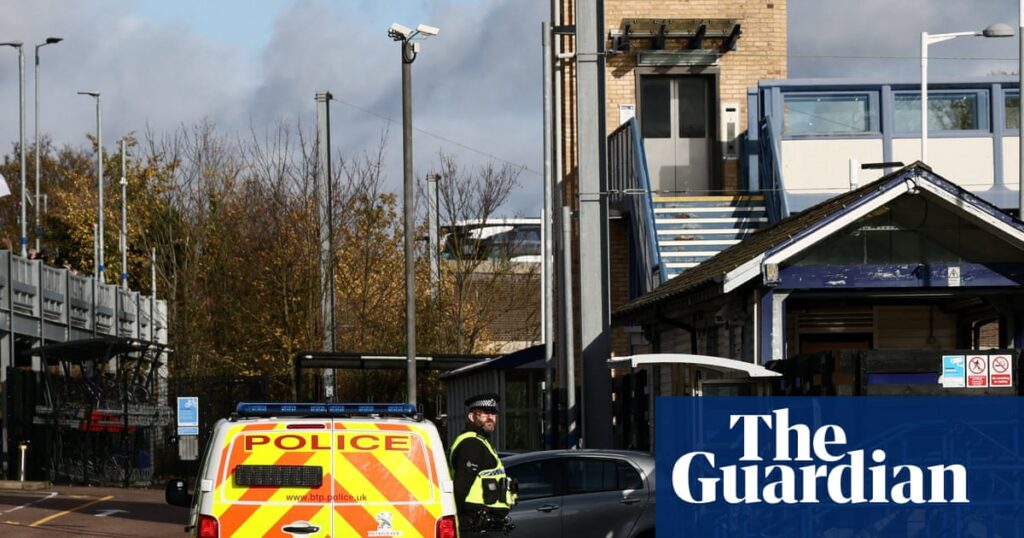Police are being forced to disclose the ethnicity of suspects in response to a rise in far-right speculation on social media, a former senior officer in the Metropolitan police force has warned.
On Sunday morning at 10.30am, British Transport Police said two men had been arrested after multiple stabbings on a train in Cambridgeshire: a 32-year-old black British national and a 35-year-old British national of Caribbean descent. The 35-year-old was released with no further action, and “was not involved” in the attack, BTP said in a statement later on Sunday evening.
New guidance was issued in August to combat misinformation on social media, which spread last summer after the murder of three schoolgirls in Southport.
Campaigners have warned that the move may encourage focus on the racial background of suspects and lead to further rightwing conspiracy theories when information is not released to the public.
Dal Babu, a former chief superintendent in the UK’s biggest force, said police having to disclose the race of suspects in incidents involving people of colour was an “unintended consequence”.
“When the new guidance was issued, I warned that there was a danger that there will be an expectation for police to release information on every single occasion,” he said.
“I have sympathy for my former colleagues in the police. They are damned if they do and damned if they don’t. They are under pressure because there is such intense speculation from the far right on social media after every major incident about the background of suspects.
“You will not find pressure on social media to name the ethnicity of suspects when black players are being racially abused on social media, for example. We are in a position in our country where race is being amplified by far-right racist groups and the police are being forced to respond. It is a worry.”
Ben Obese-Jecty, a Conservative MP whose constituency includes Huntingdon, where the train made an emergency stop during the stabbing incident, said it was “sad” but necessary that the police had to focus on swiftly releasing the ethnicities of the men arrested.
“I don’t like it. I understand why they do it. I think they actually have to do it now,” he said, speaking at Huntingdon station shortly after British Transport Police released its statement on Sunday.
“And I just think it’s sad that we’ve got to a stage where, because of the way that people leverage social media to their own ends, to push their own agendas and their narratives, the police have to get that information out there so that we’re dealing with facts and normal speculation.”
Before police released the ethnicity of the arrested men on Sunday morning, right-leaning politicians had demanded a faster response.
Chris Philp, the shadow home secretary, told the Telegraph: “The police should have released identity details by now as they said should happen, and as happened in other recent cases.” Nigel Farage, the Reform UK leader, said on X: “We need to know who committed these awful attacks as soon as possible.”
Far-right social media accounts have attempted to exploit the incident. An account called “British Patriot” – which has nearly 5,000 followers on X, including influential rightwing figures – posted an unsubstantiated claim that a knife-wielding man on the train had been shouting: “Allahu Akbar”.
Even after police revealed that the two arrested suspects were British nationals, attempts were made to suggest that information was being withheld.
Ben Habib, the former Reform UK co-leader who has now set up a party supported by the far-right activist known as Tommy Robinson, said that, in his mind, it was “almost inconceivable” that the incident was not an act of terrorism. Police said on Sunday morning: “At this stage, there is nothing to suggest that this is a terrorist incident.”
Habib compared the statement on Sunday morning by a senior police officer, who had described both suspects as British, to official statements identifying the Southport murderer as a Welshman. It was “possible” that the suspects were British but, he said, adding that the police had not released their names, “I will remain extremely suspicious until we get chapter and verse.”
The guidance was developed by the National Police Chiefs’ Council (NPCC) in recognition of “public concerns” and to ensure police processes were “fit for purpose in an age of rapid information spread”.
It was announced shortly after Reform UK accused authorities of hiding the identities and immigration status of two men – reported to be Afghan asylum seekers – charged over the alleged rape of a 12-year-old girl in Warwickshire.
In May, when a car ploughed into crowds celebrating Liverpool FC’s winning of the Premier League title, Merseyside police disclosed in the public interest that the man arrested was white and British, in order to quash rumours of a terrorist attack by an Asian man.
Decisions on releasing such information would remain with police forces, with wider legal and ethical considerations also taken into account, the NPCC said. Verifying a suspect’s immigration status would be up to the Home Office, not the police.


